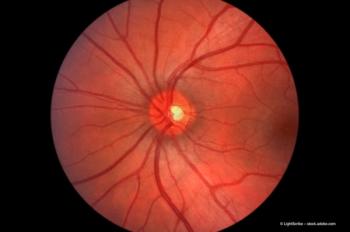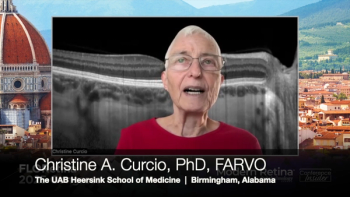
Low hormones may havbe a role in AMD pathogenesis
A new hypothesis about the development of AMD points to a role of age-depleted steroidal hormones. An ophthalmologist discusses the evidence supporting this idea.
A new hypothesis about age-related macular degeneration (AMD) pointing to a role of low hormone levels suggests that restoration to physiologic levels using bioidentical hormones may be an effective intervention, according to Dr George Rozakis, a private practitioner in the USA.
Dr Rozakis, who has a long-standing interest in anti-ageing (that is physiologic) medicine, said he believes that bioidentical hormones are crucial for wellness and health to anyone aged more than 45 years. He said he has used physiologic restoration of age-depleted hormones for years in post-LASIK patients, add that these patients benefit with an improved quality of life.
"Macular degeneration represents the intersection between anti-ageing medicine and ophthalmology and I believe optimization of steroidal hormones in addition to nutrient supplementation is something ophthalmologists should offer to patients with a potentially blinding disease," said Rozarkis.
A second review article on neurosteroids (that is, hormones) indicated that many of the hormones used in anti-ageing medicine (pregnenolone, DHEA, testosterone, estrogen and progresterone) have effects on the macula.2
A key piece for putting together the puzzle, Dr Rozakis said, derives from the work of Dr Sergey Dzugan PhD, an international expert in restorative medicine. His work showed that cholesterol elevation is directly caused by a deficiency of steroidal hormones, because cholesterol is the substrate by which hormones are made. In other words, elevated cholesterol is the body's attempt to restore proper hormone levels.
In the eye, it was recently found that cholesterol is an important component of drusen. To explain the latter information, Dr Rozakis and Dr Dzugan reasoned that the macula accumulates cholesterol, a precursor to hormone synthesis, in a compensatory attempt to address hormone deficits. This reasoning is consistent with the knowledge that the macula is a steroidogenic tissue.
AMD and other diseases
Associations between AMD and other diseases, including cardiovascular disease and dementia, provide ancillary support for this hypothesis.
"There is now increased evidence that the risks of both cardiovascular disease and dementia are increased in patients with AMD," said Rozakis. "It is also known that the risks of both cardiovascular disease and cognitive decline increase with hormonal decline such as after menopause. Steroidal hormone deficiency may be the common factor linking these conditions with AMD."
Based on this hypothesis, Dr Rozakis has been measuring serum hormone levels in patients with early macular changes, and, if these levels are low, he initiates an anti-ageing programme of hormone replacement.
To date, he has anecdotal evidence that this intervention is useful. For example, he said, patients with AMD have given him spontaneous, unsolicited reports of improved dark adaptation. In addition, the local ophthalmologist of a patient taking hormones as intervention for migraines noted that the patient's macular disease coincidentally improved.
Dr Rozakis encouraged others to consider this hypothesis and reverse age-related hormonal decline while also obtaining documentation of the patient's baseline status with visual acuity testing, retinal photography and optical coherence tomography so that changes can be gauged over time.
Diabetes, glaucoma
He said he also believes that evidence exists that a hormone-based anti-ageing programme can benefit patients with diabetes and glaucoma.
"The literature shows hormone restoration protects against pericyte death, the first step in the development of diabetic retinopathy and optimizing steroidal hormones may also offer neuroprotection for glaucomatous optic neuropathy," explained Dr Rozakis.
"In addition, there is accumulating evidence that hormonerestorative medicine benefits many disease processes. I consider it a breakthrough in medical science that has a potential role in virtually every clinical medical speciality."
Newsletter
Get the essential updates shaping the future of pharma manufacturing and compliance—subscribe today to Pharmaceutical Technology and never miss a breakthrough.




























